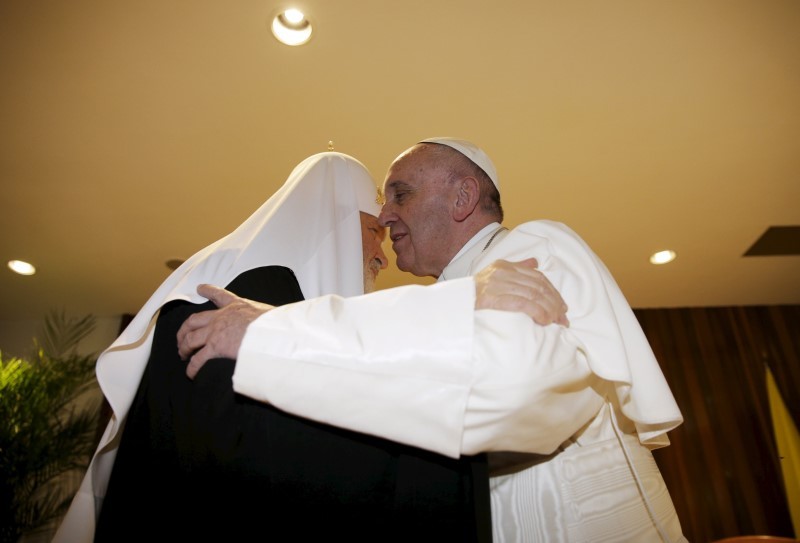
HAVANA (Reuters) – Pope Francis and Russian Orthodox Patriarch Kirill embraced and kissed on Friday in a historic meeting, uniting to issue a global appeal for the protection of Christians under assault in the Middle East.
Nearly 1,000 years after the Eastern and Western branches of Christianity split apart, the meeting at an airport terminal in Cuba was the first ever between a Roman Catholic pope and a Russian Orthodox patriarch.
“In many countries of the Middle East and North Africa whole families, villages and cities of our brothers and sisters in Christ are being completely exterminated,” they said in a joint declaration in apparent reference to violence by militant groups like Islamic State.
“Their churches are being barbarously ravaged and looted, their sacred objects profaned, their monuments destroyed.”
Cuban President Raul Castro stood to the side during the ceremony, enjoying another moment in the international limelight after receiving Francis last year and restoring diplomatic relations with the United States recently, meeting President Barack Obama in Panama in April.
The two religious leaders, guests of a Communist government, came together only a week after the encounter was announced. Such a meeting had eluded their predecessor, but Francis had issued a standing invitation to meet anytime, anywhere.
The moment came while Kirill was visiting the Caribbean island and Francis added a brief stop on his way from Rome to a long-scheduled visit to Mexico.
“Finally,” Francis said as he and Kirill entered through doors on opposite sides of a room at Havana airport to begin private talks. “We are brothers.”
Francis, dressed in white with a skullcap, and Kirill, wearing a tall, domed hat that dangled a white stole over black robes, joined arms and kissed on both cheeks.
“It is very clear that this is the will of God,” Francis said.
“Yes, things are much easier now,” Kirill said. Both men spoke through interpreters.
Their meeting carried political overtones, coming at a time of Russian disagreements with the West over Syria and Ukraine.
The Russian Orthodox Church is closely aligned with the Kremlin, which is in turn an ally of Cuba.
The Argentine pontiff helped the rapprochement between the United States and Cuba after more than five decades of estrangement.
The pope, leader of the world’s 1.2 billion Catholics, is seeking to repair a much longer rupture. Eastern Orthodoxy split with Rome in 1054.
Modern popes have met in the past with the Istanbul-based ecumenical patriarchs, the spiritual leaders of Eastern Orthodoxy.
Those patriarchs play a largely symbolic role, while the rich Russian church wields real influence because it counts some 165 million of the world’s 250 million Orthodox Christians.
(Reporting by Daniel Trotta and Philip Pullella; Editing by Andrew Hay and Alistair Bell)




